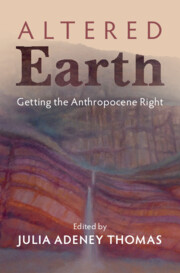Book contents
- Altered Earth
- Altered Earth
- Copyright page
- Dedication
- Contents
- Figures
- Foreword
- Acknowledgments
- Introduction: The Growing Anthropocene Consensus
- Part One Strata and Stories
- Part Two One Anthropocene; Many Stories
- Chapter 3 Earth System Science: Gravity, the Earth System, and the Anthropocene
- Chapter 4 Deep History and Disease: Germs and Humanity’s Rise to Planetary Dominance
- Chapter 5 Anthropology: Colonialism, Indigeneity, and Wind Power in the Anthropocene
- Chapter 6 The Ascent of the Anthropoi: A Story
- Chapter 7 Politics in the Anthropocene
- Chapter 8 Very Recent History and the Nuclear Anthropocene
- Chapter 9 Stratigraphy: Finding Global Markers in a Small Canadian Lake
- Chapter 10 Curating the Anthropocene at Berlin’s Haus der Kulturen der Welt
- Part Three Future Habitations
- Biographies of Chapter Contributors
- Index
- References
Chapter 9 - Stratigraphy: Finding Global Markers in a Small Canadian Lake
from Part Two - One Anthropocene; Many Stories
Published online by Cambridge University Press: 24 March 2022
- Altered Earth
- Altered Earth
- Copyright page
- Dedication
- Contents
- Figures
- Foreword
- Acknowledgments
- Introduction: The Growing Anthropocene Consensus
- Part One Strata and Stories
- Part Two One Anthropocene; Many Stories
- Chapter 3 Earth System Science: Gravity, the Earth System, and the Anthropocene
- Chapter 4 Deep History and Disease: Germs and Humanity’s Rise to Planetary Dominance
- Chapter 5 Anthropology: Colonialism, Indigeneity, and Wind Power in the Anthropocene
- Chapter 6 The Ascent of the Anthropoi: A Story
- Chapter 7 Politics in the Anthropocene
- Chapter 8 Very Recent History and the Nuclear Anthropocene
- Chapter 9 Stratigraphy: Finding Global Markers in a Small Canadian Lake
- Chapter 10 Curating the Anthropocene at Berlin’s Haus der Kulturen der Welt
- Part Three Future Habitations
- Biographies of Chapter Contributors
- Index
- References
Summary
After the 2019 Anthropocene Working Group vote to propose the Anthropocene as a geological epoch, the search began for a sequence of rock strata that could serve as the new epoch's marker. Canada's Crawford Lake has many characteristics that make it a potential candidate for this marker (known as the "geologic section," GSSP, or, more colloquially, the "golden spike.") This small, deep lake fills a karstic sinkhole on the Niagara Escarpment. The undisturbed sediment deep beneath its waters contains clear couplets called varves deposited seasonally (much like tree rings), recording annual environmental change. Core samples taken from the lake bottom tell the story of human disruption. Evidence of a nearby Iroquoian village, dating to the 13th – 15th century, illustrates human impact prior to the mid-20th century, but the magnitude of human impact in the mid-20th century is far greater, as the varves clearly show. We can read evidence of the Anthropocene in lake bottom deposits.
Keywords
- Type
- Chapter
- Information
- Altered EarthGetting the Anthropocene Right, pp. 196 - 208Publisher: Cambridge University PressPrint publication year: 2022
References
- 2
- Cited by

